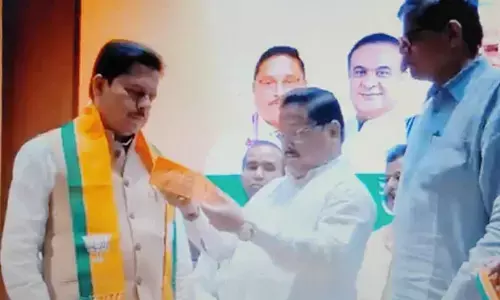Questioning is an art

The important thing is not to stop questioning. Curiosity has its own reason for existing — Albert Einstein
In all of us, curiosity is a natural force in making us learn something new. It is this curiosity that gave us a Newtown, a Fleming and a J L Baird. By nature, children show lots of interest in everything around them, like to know about all things and find joy in tinkering and tampering with them. My two young grandchildren make me run after them as they always want to explore everything around at home.
Unfortunately, when they go to school, students find it hard to sustain their burning fire of inquisitiveness, thanks to our age-old methods of teaching and disciplining them. These uncongenial conditions in schools made an American scientist write an interesting book called, 'Why don't students like school?' What are these conditions? And, how do they kill the innate creative power of students?
As a student, how many questions in all you posed to your teachers? Maybe you can count them on your fingertips. In most of our schools, students don't pose questions to teachers for fear of incurring their wrath. Even if some students dare to do it, teachers habitually feel offended. The problem is that most teachers, if not all, think that if no questions are asked at the end of the class, they deserve a pat on their back for that. One famous Indian academician once said that he felt happy and successful when his students put as many questions to him as possible at the end of each class. Questioning is the very spirit of curiosity and it is the onus of the teacher to tap that curiosity in his teaching. How some teachers famously do this!
There are teachers who could hands down spur the curiosity of their students by their imaginative ways of teaching. They are postmasters in waking up and whetting the desire and interest of students in learning things. For them the text is only a pretext as they often go out of the way in teaching a subject and making students want to do and know more and more about it.
These student-friendly teachers often convert the classroom into a volleyball court. They never dodge questions darted by students. In fact, they give lots of elbow-room to students in picking up informal chats. Such academic liberty helps students shed all their inhibitions in posing probing questions to the teacher. Interestingly, students often put some silly and imaginative questions but the teacher makes the situation even more interesting when he asks students to answer the questions themselves. All this makes learning a pleasure and a welcome experience.
Some teachers in a playful way often irritate students by making some silly and thought-provoking statements. This trick often works and makes students think. And this thinking is very vital in sustaining one's curiosity. For example, if the teacher says that Abdul Kalaam was a paperboy, students may want to know more and more about that paperboy and how he rose to become the President of India. Or if the teacher says that he doesn't like Abdul Kalaam dedicating one of his books to an Intermediate student, his students definitely show lots of interest in the entire story and put questions to the teacher about the book and the student.
ome teachers often use 'provoking' as a tool in kindling interest in students. In a class of 60 women, a teacher once asked them to write the name of the most beautiful woman in the class on a piece of paper and put them in a jar. To the surprise of all, the teacher found the names of all the 60 women in the jar! Later the teacher continued the topic of beauty and asked the students to write a short essay on the concept, 'Satyam, Sivam, Sudharam'. Such assignments, sessions, outings, educational exhibitions and tours sow the seeds of broad and critical thinking and scientific temper among students.
(The author is retired HoD Department of English S B V R Degree College, Badvel)










